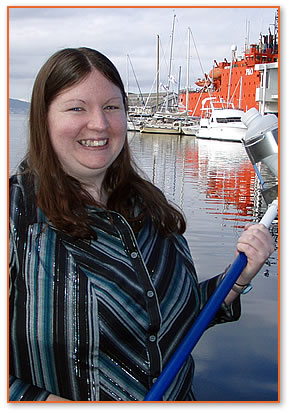Janelle Agius 
What interested you in science as a child?
I can’t pin point a certain thing or a particular time in my childhood that began my interest in science. I think it was more a progression of curiosity throughout my childhood of how and why things are the way they are. I remember tiny little experiments that I would set up as a child like how many cups of water will fill this container and what will happen if I mix this with that etc. I became really involved with science in year 7 and took part in science extended lessons that were offered in years 9 and 10 such as forensic science and organic chemistry. I studied most of the TCE science subjects on offer in years 11 and 12 having already made up my mind that I was going to study science at university.
What did you study at university?
I completed a Bachelor of Science at UTAS. Initially I thought that I would focus on zoology, but in the end environmental geology and geography won the day. I completed Honours at the Institute of Antarctic and Southern Oceans Studies (IASOS) in which my honours project focused on investigating the ecological impacts of tephra (volcanic ash) deposition within an Antarctic lake on Livingston Island.
What is your current research/career?
I am currently working within the Derwent Estuary Program with a main role of assisting the assessment of the water quality of the Derwent Estuary. I am thoroughly enjoying this position as I get to depart the office and enter the field to collect water samples in the Derwent. Seals, penguins and dolphins are a much better scene than a computer on a desk. Once the results are back from the lab it is back to the office to crunch the numbers to determine how healthy the water is for human recreational activities. I also work at the Tasmanian Institute of Fisheries and Agriculture (TAFI) where I have been involved in a number of projects, mainly lab based aspects such as chlorophyll analysis, invertebrate sorting and identification etc. I also love the scientific aspect that my volunteer work has. I volunteer with the Tasmanian Ambulance Service and I love learning about the electrical conductivity of the heart and the chemicals in the drugs and how they work to counteract a certain condition.
What are your future aspirations?
My major aspirations for the future are to keep learning, studying and enjoying science whilst also perhaps one day being able to travel and explore the world at the same time. Would love to spend some time in Antarctica, especially after doing Honours at IASOS and learning about all of the weird and wonderful research projects on the go.
What do you love about science?
The main thing that I love about science is how everything is connected. A certain rock-type will provide a particular soil, which yields a certain type of vegetation, various biology are attracted to an assortment of vegetation types, vegetation along with geographical features create their own microclimate.




